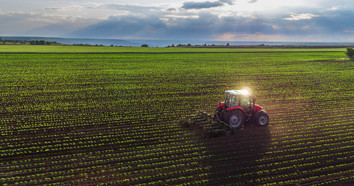Environmental sustainability is a core strategic consideration. In the agriculture sector, sustainability emphasizes decomposable products, including lubricants that traditionally were not the prime focus of ecological innovation. We’ll unpack why using biodegradable lubricants in agriculture is more than just a passing trend and explore its potential to revolutionize the way we approach farming.
The Need for Change in Agricultural Lubricants
Until fairly recently, the emphasis on lubricant development was largely on performance, durability, and protection of machinery. Environmental considerations were secondary. However, the current climate crisis demands a reevaluation of every component in the agricultural value chain, and lubricants are not exempt.
Derived from renewable sources such as vegetable oils or synthetic esters, biodegradable lubricants break down rapidly post-use, significantly reducing the risk of environmental damage.
The Science Behind Biodegradable Lubricants
Understanding the science that distinguishes a biodegradable industrial lubricant from its traditional counterparts is key to appreciating its potential benefits for agriculture.
Composition and Performance
Biodegradable lubricants share the essential features of conventional lubricants in protecting machinery from wear and corrosion. However, their composition makes them more amenable to the environment. They are typically non-toxic, minimizing harm to soil and organisms. Additionally, their high bioavailability helps them naturally break down without accumulating in the environment.
Types of Biodegradable Lubricants
There are two main types of biodegradable lubricants:
Vegetable-Based
Typically made from soybean, rapeseed, or sunflower oil, these lubricants are decomposable and have good lubricity, making them safe for the environment and suitable for many agricultural applications.
Synthetic Ester-Based
Manufacturers chemically engineer these lubricants to have specific performance properties, often with a higher tolerance for extreme temperatures and pressures. They are ideal for heavy-duty farm equipment.
Understanding each type and its benefits is key to making the most of this next-generation technology.
Environmental and Economic Implications for Farmers
The adoption of biodegradable lubricants in agriculture has tangible economic implications for the farming community. By using biodegradable lubricants, farmers can reduce their environmental liabilities while eliminating the need for costly clean-up operations typical of conventional lubricant spills.
Consumers are seeking products grown with a sustainable ethos, and farms that use biodegradable lubricants in machinery can capitalize on this market appeal. Their enhanced lubricity can lead to smoother machinery operation, reduced downtime, and higher productivity on the farm. These factors contribute to long-term operational efficiency.
A Balance of Industrial and Environmental Needs
The continued use of biodegradable lubricants in agriculture represents an innovative approach to environmental stewardship without compromising the operational needs of the industry. This shift opens a pathway to increased efficiency, reduced costs, and heightened market appeal for farmers. While we have many more hurdles to overcome, the long-term benefits of biodegradable lubricants for the agricultural sector are clear. It is through the collective efforts of farmers, manufacturers, researchers, and policymakers that we can realize this greener future.

